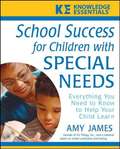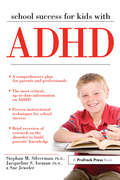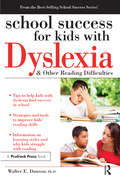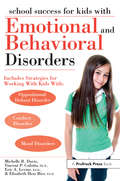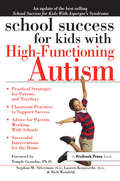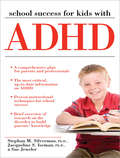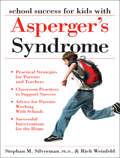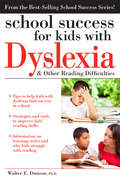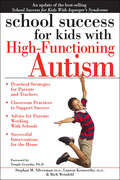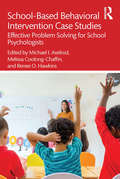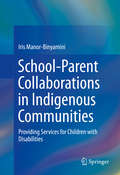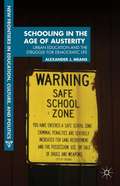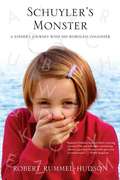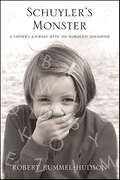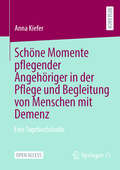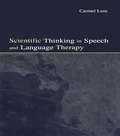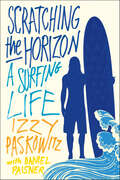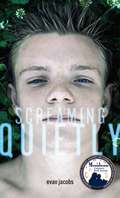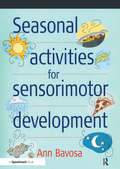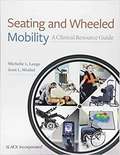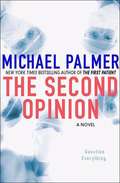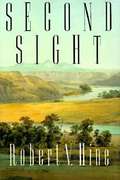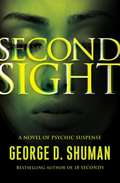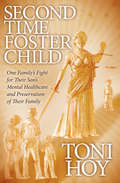- Table View
- List View
School Success for Children with Special Needs: Everything You Need to Know to Help Your Child Learn
by Amy JamesEvery child has special needs, but for those whose needs are identified as disabilities, parents and other caregivers must serve as advocates to ensure children receive the proper support. Consultant James, whose tenure as a teacher included helping to plan Individualized Education Programs (IEPs) for students considered disabled who are mainstreamed into standard classrooms, sorts out the legislation (including the Individuals with Disabilities in Education Act, the Americans with Disabilities Act and the No Child Left Behind Act), and provides extensive information in ways teachers and schools can or must accommodate a child with special needs. She covers physical, mental and learning disabilities, describes the assessment process and the role of the parent or caregiver in evaluation, the role of the caregiver as part of the education team at all ages, and steps to take when the child enters the world outside the classroom.
School Success for Kids With ADHD (School Success Ser.)
by Sue Jeweler Stephan M. Silverman Jacqueline S. IsemanSchool Success for Kids With ADHD offers parents and teachers the support they need to ensure that children with attention deficits build on their strengths, circumvent their weaknesses, and achieve to their fullest potential. With the growing number of children diagnosed with attention problems, parents and teachers need practical advice for helping these children succeed in school. Topics covered include recognizing the causes and types of attention deficits and how they appear in the school context, requesting school evaluations and diagnoses, understanding the laws regarding students with special needs, advocating for these students in the school environment, and coaching students with attention deficits to success. The authors also include a brief overview of research and medical perspectives on attention deficits, strategies used by teachers of children with ADHD, and helpful tools for parents and teachers to employ.
School Success for Kids With Dyslexia and Other Reading Difficulties
by Walter DunsonSchool Success for Kids With Dyslexia and Other Reading Difficulties provides parents and teachers with goals that will meet the needs of students who are struggling with reading, leading them to work through their difficulties and enjoy reading. It includes information, assessments, and techniques that parents, teachers, and school administrators can use immediately to foster reading success. Through an understanding of how English words are constructed, how the brain processes language, and the differences that exist between learning styles, parents and teachers will gain keen insight into the processes of reading, reading acquisition, and reading instruction. The book also covers topics such as how language skills can affect reading difficulties and how technology can be used to help students, and it provides a structured approach for parents to implement at home to help their struggling students find success.
School Success for Kids With Emotional and Behavioral Disorders
by Michelle R. Davis Vincent P. Culotta Eric A. LevineSchool Success for Kids With Emotional and Behavioral Disorders gives parents and teachers of students with Conduct Disorder, Oppositional Defiant Disorder, mood disorders, or other emotional and behavioral disorders the strategies they need to help these kids overcome their struggles and find success in school. Based on the experiences of psychologists and educators working with kids with these disorders, this book provides help for children needing to control their emotional outbursts and strategies to teach kids to monitor, review, and change their behaviors. The chapters cover topics such as managing the classroom, dealing with struggles with homework, choosing from options such as time out or restraint to control behavior, helping kids develop self-advocacy strategies and independence, and planning services and accommodations for these disorders. The book also includes multiple tools for parents and teachers to reproduce and use immediately to help their students with emotional and behavioral problems overcome their challenges.
School Success for Kids With High-Functioning Autism
by Rich Weinfeld Stephan M. Silverman Lauren KenworthySmart kids with autism spectrum disorders need specific interventions to find success in school and beyond. Featuring a foreword by Temple Grandin, School Success for Kids With High-Functioning Autism shares practical advice for implementing strategies proven to be effective in school for dealing with the“Big 10” obstacles, including social interactions, inflexibility, behavior issues, attention and organization, homework, and more.Based on the new criteria in the DSM-5, School Success for Kids With High-Functioning Autism also describes how autism spectrum disorder (ASD) and social communication disorders (SCD) will now identify the students formerly identified as having Asperger's syndrome, Nonverbal Learning Disorder, high-functioning autism, or PDD-NOS. Relying on the latest research, and presenting it in easy-to-understand and practical language, the authors identify how the key components of ASD and SCD will appear to parents and professionals and what steps should be taken once these signs are evident. This book is sure to help any parent or teacher wanting to see their smart kids with autism succeed!
School Success for Kids with ADHD
by Sue Jeweler Stephan M. Silverman Jacqueline S. IsemanTwo clinical psychologists and a K-12 teacher authored this text offering parents and teachers a clinical perspective on ADHD and strategies to manage its effect on study. Early chapters discuss how the disorder has been viewed historically and the importance of attention in academics. The authors go on to propose a multimodal management plan that involves assessment, medical monitoring, case management, educational supports, parental involvement, attention to the patient's diet, calming and relaxation techniques, and counseling, among other interventions. Also covered are best practices for teachers, support for ADHD patients in college, the role of technology in managing ADHD, and a review of alternative treatments parents can consider. Appendices contain supplementary tools for use with ADHD patients and a research summary. Annotation ©2009 Book News, Inc., Portland, OR (booknews.com)
School Success for Kids with Asperger's Syndrome: A Practical Guide for Parents and Teachers
by Rich Weinfeld Stephan M. SilvermanHundreds of thousands of children face life with Asperger's syndrome, a mild form of autism spectrum disorder that affects a child's language and social skills. Kids with Asperger's have average to above-average intelligence, but often have obsessive interests, are socially awkward, and do not understand the subtleties of language and conversation. With concentrated effort on the part of parents and educators, these children can begin to overcome the difficulties of this disorder and find success in school and life. School Success for Kids with Asperger's Syndrome covers topics such as recognizing and diagnosing Asperger's syndrome, addressing the needs of students with Asperger's, implementing successful practices in the classroom, working with the school system, and providing interventions in the home to help develop needed skills.
School Success for Kids with Dyslexia and Other Reading Difficulties (School Success #0)
by Walter Dunson"School Success for Kids With Dyslexia and Other Reading Difficulties" provides parents and teachers with goals that will meet the needs of students who are struggling with reading, leading them to work through their reading difficulties and enjoy the task of reading. It includes information, assessments, and techniques that parents, teachers, and school administrators can use immediately to foster reading success. Through an understanding of how English words are constructed, how the brain processes language, and the differences that exist between learning styles, parents and teachers will gain keen insight into the processes of reading, reading acquisition, and reading instruction. The book also covers topics such as how emotions can affect reading difficulties and how technology can be used to help students and provides handy tips for parents to implement at home to help their struggling students find success.
School Success for Kids with High-Functioning Autism
by Rich Weinfeld Lauren Kenworthy Stephan SilvermanSmart kids with autism spectrum disorders need specific interventions to find success in school and beyond. School Success for Kids with High-Functioning Autism shares practical advice for implementing strategies proven to be effective in school for dealing with the "Big 10" obstacles, including social interactions, inflexibility, behavior issues, attention and organization, homework, and more. Based on the new criteria in the DSM-5, School Success for Kids with High-Functioning Autism also describes how autism spectrum disorder (ASD) and social communication disorders (SCD) will now identify the students formerly identified as having Asperger's syndrome, Nonverbal Learning Disorder, high-functioning autism, or PDD-NOS. Relying on the latest research presented in easy-to-understand and practical language, the authors identify how the key components of ASD and SCD will appear to parents and professionals and what steps should be taken once these signs are evident. This book is sure to help any parent or teacher wanting to see their smart kids with autism succeed!
School-Based Behavioral Intervention Case Studies: Effective Problem Solving for School Psychologists
by Michael I. Axelrod Melissa Coolong-Chaffin Renee O. HawkinsSchool-Based Behavioral Intervention Case Studies translates principles of behavior into best practices for school psychologists, teachers, and other educational professionals, both in training and in practice. Using detailed case studies illustrating evidence-based interventions, each chapter describes all the necessary elements of effective behavior intervention plans including rich descriptions of target behaviors, detailed intervention protocols, data collection and analysis methods, and tips for ensuring social acceptability and treatment integrity. Addressing a wide array of common behavior problems, this unique and invaluable resource offers real-world examples of intervention and assessment strategies.
School-Parent Collaborations in Indigenous Communities
by Iris Manor-BinyaminiPoverty. Lack of social support. Limited access to education. High risk for health problems. Indigenous communities face an inordinate number of hardships. But when children have special needs, these problems multiply exponentially, making existing difficulties considerably worse. School-Parent Collaborations in Indigenous Communities: Providing Services for Children with Disabilities begins with an in-depth overview of indigenous experience and psychology, and situates disabilities within the contexts of indigenous communities and education services. The pilot study at the core of the book, conducted among the Bedouins of southern Israel, shows this knowledge in action as special education personnel engage parents in interventions for their children. Going beyond facile concepts of cultural sensitivity, the model recasts professionals as cultural mediators between school and family. This practice-oriented information has the potential to improve not only the well-being of children and families, but of the greater community as well. Featured in the coverage: Unique characteristics of indigenous communities and children with disabilities. Psychological models of reactions to disability. Benefits of multidisciplinary teams. Factors affecting collaboration between indigenous parents of children with disabilities and school professionals. Core principles of indigenously attuned collaboration. An extended case study on collaboration between parents of children with disabilities and school professionals in a Bedouin community. School-Parent Collaborations in Indigenous Communities is a breakthrough resource for researchers, graduate students, and professionals working with special needs children in child and school psychology, international and comparative education, social work, cross-cultural psychology, public health, and educational psychology.
Schooling in the Age of Austerity: Urban Education And The Struggle For Democratic Life (New Frontiers In Education, Culture And Politics Ser.)
by Alexander J. MeansThrough a case study in a Chicago public school, Means demonstrates that, despite the fragmentation of human security in low-income and racially segregated public schools, there exist positive social relations, knowledge, and desire for change that can be built upon to promote more secure and equitable democratic futures for young people.
Schuyler's Monster: A Father's Journey with His Wordless Daughter
by Robert Rummel-HudsonWhen Schuyler Rummel-Hudson was eighteen months old, a question about her lack of speech by her pediatrician set in motion a journey that continues today. When she was diagnosed with bilateral perisylvian polymicrogyria (an extremely rare neurological disorder), her parents were given a name for the monster that had been stalking them from doctor to doctor, and from despair to hope, and back again. Once they knew why Schuyler couldn't speak, they needed to determine how to help her learn. They took on educators and society to give their beautiful daughter a voice, and in the process learned a thing or two about fearlessness, tenacity, and joy. More than a memoir of a parent dealing with his child's disability, Schuyler's Monster is a tale of a little girl who silently teaches a man filled with self-doubt how to be the father she needs. Robert Rummel-Hudson has been writing online since 1995. His work has been recognized by the Diarist Awards at diarist. net, including citations for Best Writing, Best Overall Journal, Best Account of a Public or News Event, Best Dramatic Entry, and the Legacy Hall of Fame Award. He has served three times as a featured panelist at JournalCon, an annual conference for online writers. His online writing has been featured in articles in the Austin Chronicle , the Irish Times and the New Haven Register . Robert and his family currently live in Plano, Texas. When Schuyler was 18 months old, a question about her lack of speech by her pediatrician set in motion a journey that continues today. When she was diagnosed with Bilateral perisylvian polymicrogyria (an extremely rare neurological disorder caused by a malformation of the brain), her parents were given a name for the monster that had been stalking them throughout the search for the correct answer to Schuyler''s mystery. Once they knew why she couldnâ t speak, they needed to determine how to help her learn. Schuylerâ s Monster is more than the memoir of a parent dealing with a childâ s disability. It is the honest, funny, and heart-wrenching story of the relationship between a unique and ethereal little girl and her father who struggles with whether or not he is the right dad for the job. It is the story of a family seeking answers to a childâ s dilemma, but it is also a chronicle of their unique relationships, formed without traditional language against the expectations of a doubting world. It is the story of a little girl who silently teaches a man filled with self-doubt how to be the father she needs. "A gripping explication, shot through with equal parts horror and hope, of how parenthood can turn ordinary people into passionate advocates. "â " Neal Pollack, author of Alternadad "Robert Rummel-Hudson is brave enough to reveal the damage the discovery of his child''s condition did to his marriage and to his own sense of self. He manages to repair some of the damage through close involvement with Schuyler and vigorous campaigning on her behalf. His memoir is honest, often painful and deeply personal. "â " Charlotte Moore, author of George & Sam "The book is engaging and honestâ "I''m sure it will help many parents who are struggling to find the most loving way to help their children who have â issues. â "â " Dana Buchman, author of A Special Education "The monster in this heartfelt memoir is polymicrogyria, an extremely rare brain malformation that, in the case of Rummel-Hudson''s daughter Schuyler, has completely impaired her ability to speak. During her first three years, as her parents seek to find out what hidden ''monster'' is causing her wordlessness, they endure ''two years of questions and tests and at least one unsatisfactory diagnosis. '' But while Rummel-Hudson initially rages at God for giving Schuyler ''a life that would never ever be what we''d imagined it to be,'' his depiction of her next four years becomes a study not only in Schuyler''s vivacious and resilient personality, but also in the redeeming power of understanding and a ''stup
Schuyler's Monster: A Father's Journey with His Wordless Daughter
by Robert Rummel-HudsonSchuyler's Monster is an honest, funny, and heart-wrenching story of a family, and particularly a little girl, who won't give up when faced with a monster that steals her voice but can't crush her spirit.When Schuyler was 18 months old, a question about her lack of speech by her pediatrician set in motion a journey that continues today. When she was diagnosed with Bilateral perisylvian polymicrogyria (an extremely rare neurological disorder caused by a malformation of the brain.), her parents were given a name for the monster that had been stalking them from doctor visit to doctor visit and throughout the search for the correct answer to Schuyler's mystery. Once they knew why she couldn't speak, they needed to determine how to help her learn. They didn't know that Schuyler was going to teach them a thing or two about fearlessness, tenacity, and joy. Schuyler's Monster is more than the memoir of a parent dealing with a child's disability. It is the story of the relationship between a unique and ethereal little girl floating through the world without words, and her earthbound father who struggles with whether or not he is the right dad for the job. It is the story of a family seeking answers to a child's dilemma, but it is also a chronicle of their unique relationships, formed without traditional language against the expectations of a doubting world. It is a story that has equal measure of laughter and tears. Ultimately, it is the tale of a little girl who silently teaches a man filled with self-doubt how to be the father she needs. Schuyler can now communicate through assistive technology, and continues to be the source of her father's inspiration, literary and otherwise.
Schöne Momente pflegender Angehöriger in der Pflege und Begleitung von Menschen mit Demenz: Eine Tagebuchstudie
by Anna KieferIn diesem Open Access-Buch wird gezeigt, wie pflegende Angehörige mit Hilfe einer Tagebuchvorlage auf die Wahrnehmung schöner Momente in der Begleitung ihrer an Demenz erkrankten Familienmitglieder sensibilisiert werden können. Tagebücher sind eine beliebte Möglichkeit zur Verarbeitung und Bewältigung von Krisensituationen und können dabei der Selbstreflexion und Belastungsverarbeitung dienen. Insbesondere positives Schreiben kann durch das Erinnern und Reflektieren schöner Momente und Emotionen nachweislich zu einem höheren Wohlbefinden und zur Steigerung der Selbstwirksamkeit führen. Die Begleitung eines Menschen mit Demenz geht für pflegende Angehörige häufig mit einer Vielzahl an Belastungen und Herausforderungen einher, weshalb diese häufig aus der Belastungsperspektive erlebt wird. Schöne Momente innerhalb der Sorgebeziehung zwischen pflegenden Angehörigen und Menschen mit Demenz werden dabei seltener bewusst wahrgenommen. Die Ergebnisse der Tagebuchstudie zeigen individuelle Auswirkungen der Wahrnehmung und Sensibilisierung schöner Momente.
Science Literacy: A Curriculum for All Students With Sensory Impairments
by Jodi Peters Mary Zatta Kate Fraser Sharon Stelzer Becky Vercollone Michele EngelbrechtAll students benefit from a consistent foundation of science concepts. Students with disabilities require a sufficient amount of time devoted to science instruction in order to grasp these basic concepts. By participating in high-expectation, inquiry based, interdisciplinary K-12 education, students have the opportunity to develop science concepts. This curriculum meets the individual needs of diverse learners. Individuals learn about the world mostly through their senses of vision and hearing. When vision and hearing are reduced, the losses affect communication and concept development, resulting in the need for significant adaptations to how content is taught and learned. This curriculum has been developed with these adaptations in mind.
Scientific Thinking in Speech and Language Therapy
by Carmel LumSpeech and language pathologists, like all professionals who claim to be scientific in their practice, make a public commitment to operate on the basis of knowledge derived in accordance with sound scientific standards. Yet students in communication disorders are given relatively little grounding in the fundamentals of science; indeed, they often receive implicit encouragement to rely on clinical wisdom. This pathbreaking text introduces the principles of critical scientific thinking as they relate to assessing communication problems, deciding about alternative approaches to intervention, and evaluating outcomes. The author provides many illustrative examples to help readers contextualize the ideas. Her clear presentation will help not only undergraduate and graduate students but also established professionals reason more effectively about what they are doing and why. Though the examples come from speech and language pathology, this illuminating and readable book constitutes a valuable resource for all clinical practitioners.
Scratching the Horizon: A Surfing Life
by Daniel Paisner Izzy PaskowitzScratching the Horizon presents a bitchin' love letter to sand and sea, and a spirited inside account of life with the "first family" of American surfing.In 1956, Dorian "Doc" Paskowitz stepped away from a successful medical practice and began a lifelong surfing odyssey that grew to include his wife Juliette, and their nine children. Together, the Paskowitz clan lived a vagabonding bohemian existence, eschewing material possessions in favor of intangible riches like health and good cheer . . . all the while careening along the world's coastlines in search of the perfect wave.In Scratching the Horizon, Izzy Paskowitz looks back at his unusual upbringing, and his lifelong passion for the sport that carries his family's stamp. As the fourth-oldest child in a family of inveterate surfers, rock stars, and beach bums, he is uniquely qualified to shine a light on a childhood that has come to symbolize the surfing credo, a reckless young adulthood that nearly cost him his sanity, and a maturing sense of self and purpose that allows him to lift others on the back of his experience.As the father of a son with autism and the founder of "Surfers Healing," a foundation devoted to expanding the horizons of children with autism through surfing, Paskowitz has found a way to connect the surreal aspects of his childhood to the harsh realities of adulthood, and he shares these discoveries in this wickedly entertaining and transforming memoir.
Screaming Quietly
by Evan JacobsIan Taylor is a varsity football player at School, dating one of the hottest cheerleaders on campus. At home he is his divorced mother's right hand, helping her to keep his younger autistic brother, Davey, in line. Ian considers Davey a freak. And no one must ever know about him. But it's a game changer when Davey begins attending a special day class at Ian's school. Undaunted, Ian continues his charade of denying Davey's existence, even when Davey has massive public meltdowns. He internalizes his strong feelings--Screaming Quietly inside--until resentment, anger, and embarrassment force him to burst. But his love for Davey and his desire to man up eventually allow him to overcome peer pressure and fully own his life.
Seasonal Activities for Sensorimotor Development
by Ann BavosaThis book contains easy-to-use activities for therapists, educators and carers to provide fun and engaging sensorimotor groups for students with movement and sensory dysfunction. The activities span an entire year with a different main activity for each week. Themed by season, the activities can be linked to the school year and incorporated into the classroom. The activities promote socialisation, postural strengthening, improvement of gross and fine motor skills, and self-regulation of the body. Comprehensive instructions on how to run a group are included, as well as benefits and adaptations for severely affected individuals and wheelchair users. There are sensory-regulating warm-up appetizers to increase body awareness and prepare the students for movement; main course activities to strengthen fine and gross motor skills; and cool-down desserts to regulate the body and assimilate benefits gained during group activities. The activities are suitable for use with any school-age students, including those without movement difficulties, but are especially beneficial for students with mild to moderate motor disabilities, who exhibit increased difficulty functioning in a group setting.
Seating And Wheeled Mobility: A Clinical Resource Guide
by Michelle L. Lange Jean MinkelSeating and Wheeled Mobility: A Clinical Resource Guide presents clinical assessment considerations when working with a person with a disability who may need wheelchair seating for postural support, skin integrity, or a wheelchair base to best meet dependent or independent mobility needs. <p><p> Michelle L. Lange and Jean Minkel have designed this text to support occupational and physical therapists, complex rehabilitation technology suppliers, and even third-party payers who are interested in wheelchair seating and mobility assessment and applications. Seating and Wheeled Mobility provides a wide spectrum of information from foundational information for those practitioners who are new to the field to in-depth, population-specific information for practitioners who perhaps have not worked with a particular population in the past. <p> Seating and Wheeled Mobility: A Clinical Resource Guide provides the depth and breadth of the clinical practice of wheelchair seating and mobility to both those who are new to the field, as well as seasoned professionals.
Second Opinion
by Michael PalmerDr. Thea Sperelakis, diagnosed as a teen with Asperger's syndrome, has always been an outsider. She has a brilliant medical mind, and a remarkable recall of details, but her difficulty in dealing with hidden agendas and interpersonal conflicts have led her to leave the complex, money-driven dynamics of the hospital, and to embrace working with the poor, embattled patients of Doctors Without Borders. Her father, Petros, is one of the most celebrated internal medicine specialists in the world, and the founder of the cutting-edge Sperelakis Center for Diagnostic Medicine at Boston's sprawling, powerful Beaumont Clinic. Thea's rewarding life in Africa is turned upside-down when Petros is severely injured by a hit-and-run driver. He is in the Beaumont ICU, in a deep coma. No one thinks he will survive. Thea must return home. Two of Petros' other children, both physicians, battle Thea and her eccentric brother, Dimitri, by demanding that treatment for their father be withheld. As Thea uncovers the facts surrounding the disaster, it seems more and more to be no accident. Petros, himself, is the only witness. Who would want him dead? The answers are trapped in his brain . . . until he looks at Thea and begins slowly to blink a terrifying message. In The Second Opinion, Michael Palmer has created a cat-and-mouse game where one woman must confront a conspiracy of doctors to uncover an evil practice that touches every single person who ever has a medical test. With sympathetic characters and twists and betrayals that come from the most unlikely places, The Second Opinion will make you question...everything.
Second Sight
by Robert V. HineThe author talks about when he goes blind, the things that happen to him, and when he regains his sight
Second Sight: A Novel of Psychic Suspense
by George D. ShumanStunningly beautiful psychic Sherry Moore's world has been draped in darkness for as long as she can remember. Though she has been blind since childhood, her extraordinary gift for seeing the last eighteen seconds of a deceased person's memory has helped solve numerous crimes and save countless lives. Her life has been anything but normal, but because of her relationship with Brian Metcalf, the Navy SEAL she met during a dramatic rescue on Mount McKinley, Sherry has never been happier. Then her exposure to deadly radiation changes everything. Unnerved about the radiation's possible aftereffects and suffering from optical migraines, Sherry checks herself into the hospital to undergo tests. All seems normal until they wheel in the body of one Thomas Monahan. Vivid, terrifying images from his memory flood her thoughts the moment she grasps his hand. She feels a connection take hold as she thrashes about on the gurney, finally letting out a bloodcurdling scream. When Sherry next opens her eyes, for the first time in thirty-two years, she can see. They call it a miracle. But for Sherry life with sight proves to be more complicated. She has to navigate the world anew, troubled by the agonizing, unanswered question: Who was this man and how had he enabled her to regain her vision? Enlisting the help of retired Admiral Garland Brigham, her confidant and best friend, Sherry doggedly begins to unravel this complicated history and unearths some startling revelations, beginning with the work of Edward Case. Case is a man used to getting his way. The CEO of pharmaceutical giant Case & Kimble, he has the nation's elite on speed dial. But unsettling rumors have circulated for years about the genesis of the company's stratospheric success, questioning how this upstart firm has gained prominence and grown to be a monolithic institution worth billions of dollars. How its drugs always seem to make it onto the market before those of its competitors. If the secrets to C&K's dominance are ever made public, they will destroy the empire Case has so carefully constructed. And he will stop at nothing to keep his domain intact. Flush with pounding action and shocking twists, Second Sight is the riveting story of an astounding heroine who, in delving into the darkest corners of the pharmaceutical trade, risks her life to set right an injustice buried deep in the past.
Second Time Foster Child: One Family's Fight for Their Son's Mental Healthcare and Preservation of Their Family
by Toni Hoy&“Toni walks us through the experience of having foster children with undiagnosed mental illness . . . moving and heart-wrenching&” (Marcia Stein, PHR, CA, author of Strained Relations). As an infant, Daniel entered the foster care system as a result of severe neglect, which manifested in violence and aggression later in his childhood after he was adopted by Jim and Toni Hoy. Desperate to get him into a residential treatment center and keep their other children safe, Jim and Toni were given two options by the state of Illinois: either keep him in a psychiatric hospital or be charged by the Department of Children and Family Services with child endangerment for failure to protect their other children. Mental health professionals recommended abandoning Daniel at the hospital after the state denied all viable sources of funding for his treatment. So Daniel re-entered the foster care system for no other reason than he was mentally ill. A year later, Daniel&’s mother discovered that his treatment was covered by a funding source that he was awarded as part of his special needs adoption. How could they get the state government to understand the federal law and re-gain custody of their son? Second Time Foster Child is the story of parents who never gave up on their son, despite being prosecuted and persecuted in exchange for his medically necessary treatment. &“Toni Hoy bares her soul in this courageous true story of her family&’s journey to help and heal her severely traumatized adopted son.&” —Michael Groomer, founder, and Beverly Hansen, executive director, Advocates for Children of Trauma
